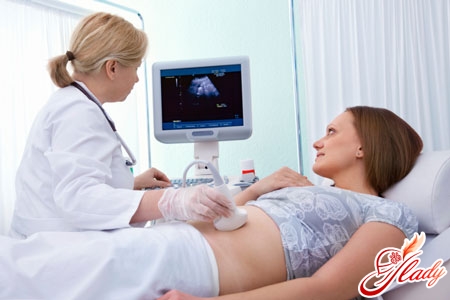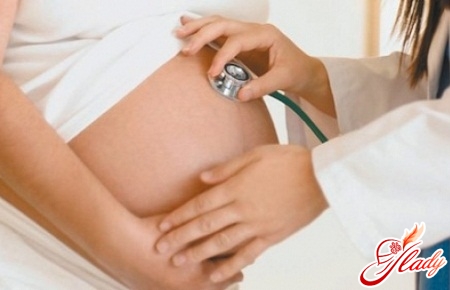
A frozen pregnancy is one of the following:types of miscarriage. Such misfortune can happen more often in the early stages, but in some cases, the fading occurs in the second trimester of pregnancy - after 14 weeks.
Signs of a stiff pregnancy at the beginning of the first trimester
In this case, the development of the fetus stopsvery early and the symptoms of a frozen pregnancy may not even be perceived by the woman. Most often, pregnancy up to 3 weeks is not yet diagnosed, and no one suspects it. Bloody discharge is perceived as another menstruation. In this case, only one thing can be alarming - heavy discharge compared to usual, and longer bleeding. A frozen pregnancy at an early stage is almost painless, the woman does not experience stress and depression about the loss of the child. This is the mildest case.
Signs of a frozen pregnancy at a later date
It is often possible to establish that a woman is pregnant after 4 weeks - due to the absence of menstruation. By this time, other signs accompanying pregnancy appear:
- increase and sensitivity of the breast,
- increase in basal temperature,
- strong manifestations of toxicosis.
But even when the fetus suddenly stops developing, these signs may persist and the first signs appear, indicating its death and the beginning of rejection of the fetus:
- Stretching pain in the lower abdomen and in the lower back,
- bloody issues,
- a rise in temperature of more than 37.5 ° C.
If a woman simply does not feel nauseated orpain in the mammary glands - this should not be a cause for concern. Pregnancy is different for everyone. You should start worrying if, with severe toxicosis, it suddenly passes. The appearance of nagging pain in the lower abdomen at this time may not be a sign of trouble - in the early stages, pain similar to menstrual pain can appear due to the fact that blood flows to the uterus, the ligaments of the uterus stretch and swell. These unpleasant sensations quickly pass if you lie down and relax. And you do not need to worry too much about this. You should be alerted by pain that does not go away even after taking medication. If they are combined with the appearance of bloody discharge from the vagina - you need to call an ambulance. Independent determination of a frozen pregnancy, as follows from the above, is almost impossible. Therefore, you must adhere to the terms of visiting the antenatal clinic, which will be set by the doctor. Only in this case will he be able to identify the symptoms and signs of a frozen pregnancy in the first trimester in time:
- Stopping the fetal heartbeat - using ultrasound;
- The embryo's growth has stopped or the fertilized egg is empty - only an ultrasound can show this;
- A discrepancy between the size of the uterus and the expected gestational age is only possible with a gynecological examination;
- The hCG level can only be determined by a blood test.
The final diagnosis can only be established based on the comprehensive results of all studies, so do not panic if it seems that something is wrong. You just need to see a doctor.
Signs of pregnancy fading in the second trimester
After 16 weeks, the expectant mother may noticeslight movement in the lower abdomen - this is her baby starting to move. At first, these are very light jolts, a vague sensation of touching from the inside. Such jolts are repeated up to 10 times a day. At this stage, the most obvious symptoms of pathology are the cessation of fetal movement for one day. In this case, you need to urgently visit your gynecologist. Other signs of impending trouble:
- The breast becomes soft, habitual alreadytension suddenly disappears and there are discharge in the form of colostrum. The formation of colostrum can be quite normal sign of pregnancy, but it will be superfluous to consult a doctor.
- Upon examination, the doctor will find that the size of the uterus is notcorrespond to the gestational age. The symptom may indicate an incorrectly established gestational age, but it may also indicate a frozen pregnancy. The doctor will be able to make a more accurate diagnosis only at the next visit - in a week. If the uterus does not increase in size, this indicates that the fetus is not growing.
- To clarify the diagnosis, you will need to take tests for hCG - at this time, during a normal pregnancy, its level is the highest, and a decrease in it will unmistakably indicate a pathology.
- Ultrasound will accurately confirm what happened.
Not visiting a doctor in time if you suspecta frozen pregnancy, a woman exposes herself to mortal danger. In some cases, the fetus is rejected and the process ends in a miscarriage. But sometimes the dead fetus can remain in the woman's body for some time, causing intoxication. This is evidenced by an increase in temperature, abdominal pain and increasing weakness. These symptoms indicate the need for urgent hospitalization. Special drugs prescribed by the doctor will cause contraction of the uterus, which will lead to a miscarriage. Then the uterine cavity will be cleaned of the remains of the fetal placenta and the woman will be able to become pregnant again after a short treatment. A frozen pregnancy in the second trimester is a lot of stress for a woman. But if the diagnosis is made in time, there is hope to avoid the threat of miscarriage. You should not become depressed and afraid of getting pregnant again - next time you will have to pay attention to your health before conception and during pregnancy.
A little bit about prevention
Among the common reasons for pregnancy fading areFirst place goes to various infections. The body's defenses are noticeably reduced during pregnancy, and even a common acute respiratory viral infection can be severe. Then the fetus is not threatened by the virus itself, but by the mother's body's reaction to it, as a result of which the fetus does not receive the necessary nutrients and oxygen. A frozen pregnancy is typical when infected with toxoplasma, which can be contracted from domestic animals; among the infections dangerous to a pregnant woman are chlamydia, cytomegalovirus, and herpes. Several more common risk factors:
- The negative impact on the development of the fetus is alcohol and smoking, taking drugs.
- Frequent stress and taking antidepressants can lead to pregnancy fading.
- Hormonal imbalances in the body - lack of estrogen and progesterone, imbalances in them affect the development of the fetus.
If the worst has happened, there is no reasondespair - after undergoing examination and treatment for diseases, getting rid of bad habits, a woman has the opportunity to become pregnant again, carry and give birth to a healthy baby. Take care of yourself and be happy!









